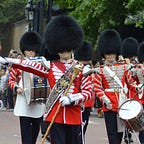A common thread affecting 20th century music and 21st century music
Some research ideas lead to other avenues
For this week’s post, I had intended to research how often Lili Boulanger was mentioned in archived newspapers. Lili Boulanger, and her sister Nadia, were French female composers from the early 20th century. I was on a quest to see if these female composers were discussed much in their own contemporary times. But, my research path abruptly changed!
What is the common thread?
The first article that I perused, a piece from the New York Times dated October 20th, 1918, did have a mention of Lili Boulanger. But there was additional information in the article that led me down a completely different research path, to a topic that is as relevant now in our current world affairs as it was in Boulanger’s time. Here is a snippet from the article:
“The Boston Symphony Orchestra has postponed for two weeks now, until next Friday, the opening of its home season. This was due to the prevailing influenza, which it is hoped will be abated when the men come here on tour.”
Wow! I was stunned! Of course, the article is referencing the 1918 flu pandemic which killed an estimated 650,000 US citizens and 50–100 million people worldwide. How odd that I would be reading this article a little over one hundred years later only to find ourselves in a similar pandemic.
As I searched further for commonalities between the 1918 flu pandemic and our present day Covid-19 crisis, I found eerily familiar headlines and discussions: the use of masks, the staggering of work hours to prevent the spread of infection, the closing of schools, the cancellation of concerts, obituaries for those who had died from the virus, rules and regulations to be followed.
I also read, with horror, of a planned 1918 community sing-along in San Francisco for about 50,000 people with the intent to address peace and WWI. The size of the event was approved by local authorities with only one regulation: masks were required. A large group of people singing along with the presence of a “municipal band”… even with masks, this sounds like a super-spreader event!
Another interesting aspect of music and the 1918 pandemic was that music sales soared (phonograph records and player piano rolls). It was felt that the increase in sales was due to the prohibition against large gatherings, including at concert halls and churches. Certainly, we have seen a similar trend with the transition from in person concerts to online music offerings.
As my fellow classmate, HelloWorld, discusses in her blogpost, “What is 20th Century Music??”, current events in society can shape the music of that era. These events can include political uprisings, armed conflicts, and/or struggles for racial or gender equality. Any occurrence that affects humanity, even a pandemic, is bound to affect the musical output of composers. We sees this in the music addressing the Vietnam War and the civil rights movements in the US. What music might we see composed in our era and inspired by the Covid-19 pandemic?
What does this have to do with 20th and 21st century music?
Well, a lot. This is my message to my fellow music students, to musicians and to all the citizens of the world. Continue forward in these strange, yet historically familiar times, with hope and perseverance. If the people of 1918 can make it through a flu pandemic AND a simultaneous world war, we certainly can forge ahead through our own pandemic.
I imagine it is often on the mind of music students, particularly those in master’s or doctoral programs who have spent years invested in music studies and practice, about what the future holds for them. How disconcerting it must be to have your intended career turned upside down and refashioned. But the musicians of 1918 came out the other end of the tunnel and so will we! Look at all that we have learned and adapted to already due to Covid-19: online zoom classes, new ways of performance. I believe there will be a future for in person concerts. Be prepared… continue forward, continue studying, continue practicing so that you will be at the top of your game when some form of musical normality returns. Remember the word, “impermanence”, for nothing is permanent forever!
